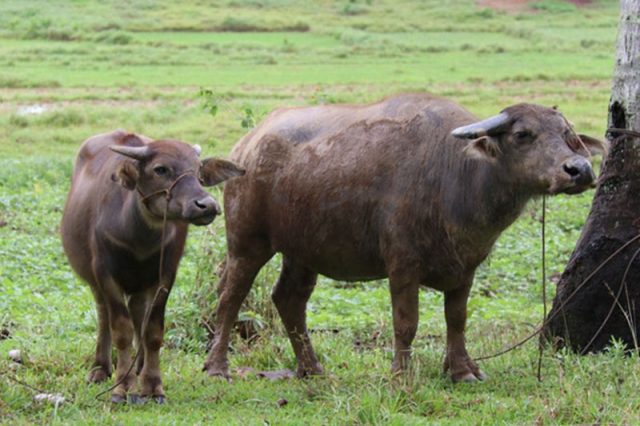
Reading comprehension left the group?
Online Filipinos were baffled by the thousands of sad reactions a news report received which was about the distinctness of two domesticated water buffaloes in the country.
Philstar.com on Wednesday, September 18 reported that scientists have determined that there are two types of carabaos in the Philippines — the swamp buffalo (Bubalus bubalis carabensis) and the riverine buffalo (Bubalus bubalis bubalis).
The country has traditionally classified them as two subspecies of the domesticated buffalo (Bubalus bubalis).
But Filipino scientists confirmed that the swamp buffalo has a unique DNA sequence of genes compared to riverine buffaloes.
Each was also found to have a different number of chromosomes, with the swamp buffalo — also more commonly known as the Philippine native carabao — having 48 chromosomes, while the riverine buffalo has 50.
This prompted scientists to propose renaming the swamp buffalo from Bubalu bubalis carabenesis to Bubalus kerabau, since it is distinct from domesticated buffaloes.
It aligns with Austrian zoologist Leopold Joseph Fitzinger‘s classification of the swamp buffalo in 1860.
Researchers said that consistently examining species in the country will help determine effective breeding strategies to avoid biodiversity loss.
Species are essential in the conservation of ecosystems.
A species is a group of organisms that share common characteristics and genetic structure that can interbreed among themselves.
Meanwhile, a subspecies is identified when there are organisms of the same species with distinct characteristics or traits, such as having a different color or behavior.
“Confusions on the classifications of the two buffaloes have implications on the breeding program of these species,” University of the Philippines biology professor Ian Kendrich Fontanilla shared.
A swamp buffalo is used as a draught animal, or an animal that helps cultivate farms and transport tools and produce. They are only used as an alternative for meat, milk, hide and manure for organic fertilizer.
On the other hand, a riverine buffalo is used in milk and meat production.
Dr. Lilian Villamor, one of the researchers from the Philippine Carabao Center, said that swamp buffalos “can be identified by the white or light gray markings on their lower jaw and brisket, known as a chevron, as well as their lighter skin and coat color compared to riverine buffaloes.”
Riverine buffalos are larger and have curly horns.
RELATED: Scientists: Philippine native carabao, riverine buffalo are ‘distinct species’
‘Distinct’ vs ‘extinct’
The report about the carabaos’ distinctness appeared to be misinterpreted by some Filipinos who thought that the term “distinct” was synonymous with “extinct.”
“Filipino scientists discovered in their recent studies that the two subspecies of domesticated water buffaloes in the Philippines are distinct species,” The STAR wrote in a social media post featuring the link to the report.
The post has received 10,000 likes and reactions, 2,000 shares, and over 1,000 comments, with some Filipinos asking why there were lots of sad reactions.
As of this writing, the post has 2,400 sad reactions.
“Waah, I was a bit surprised to see so many sad reactions to this post! After checking the comments, I realized some thought ‘distinct’ meant ‘extinct.’ Let’s clear that up — this is great news! Filipino scientists discovered that our domesticated water buffaloes are distinct species!” a Facebook user said.
“Bakit sad? Distinct po, hindi extinct,” another user commented with smiling-with-sweatdrop emojis.
“‘Distinct’ species, meaning, recognizably different or naiiba. Not extinct or whatever, they’re doing just fine,” wrote a different Pinoy.
“Mas madami nalungkot kesa sa namangha,” another user said.
“Nakakatakot ang reading comprehension ng mga naka-sad react, ‘yung distinct ay ginawang extinct,” wrote another user.
An established dictionary defines “distinct” as “distinguishable to the eye or mind as being discrete or not the same.”
Its synonyms are different, unalike, and nonidentical, among others.
Meanwhile, “extinct” is defined as “no longer existing.” Its synonyms include dead, defunct, and gone.
There have been reports about the Philippines’ low rankings in terms of literacy rate.
In 2022, the World Bank said that 90% of Filipino children aged 10 struggled to read simple texts. The figure significantly increased from 70% in 2019.
Filipino students also performed the worst in terms of reading comprehension among all participating countries in the 2018 Programme for International Student Assessment (PISA).
The Southeast Asian country likewise ranked in the bottom 10 out of 81 countries in reading comprehension, mathematics and science, based in the 2022 PISA.
Reading comprehension is the ability to read text, process it, and understand its meaning. It is the ability to understand what one reads.




